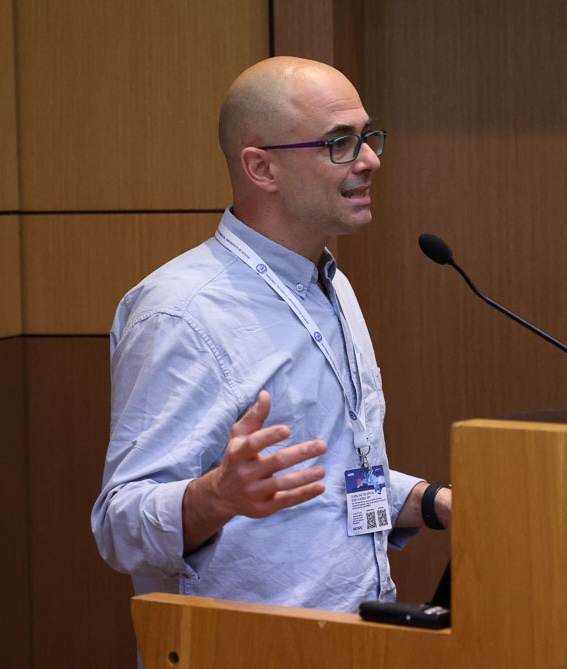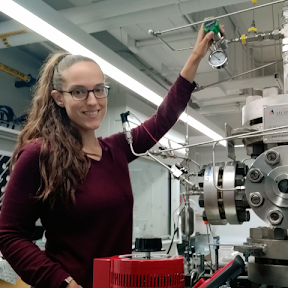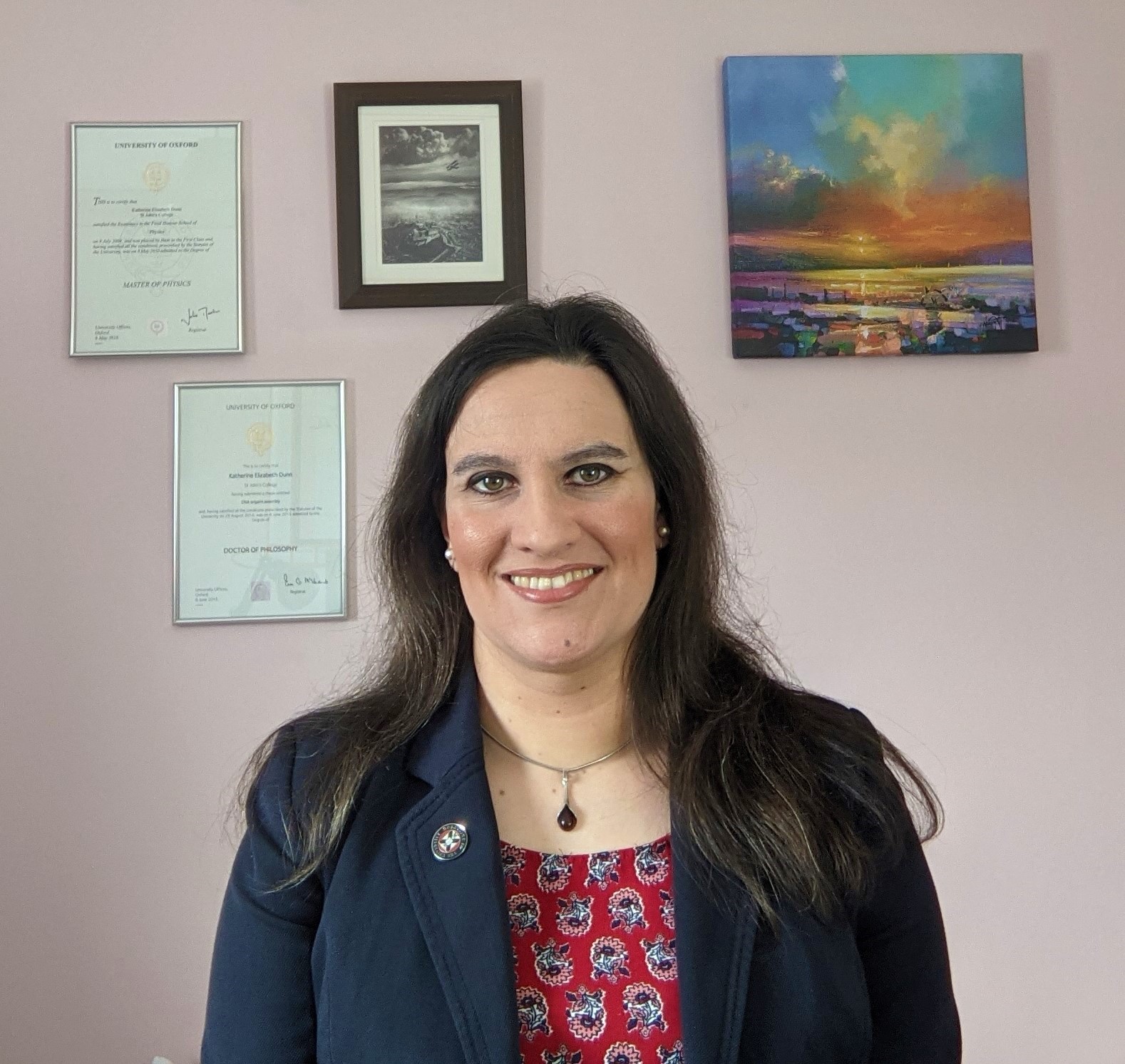
Mechanical Engineering


1985, BE, Mechanical Engineering, National University of Ireland, Galway 1987, MEngSc, Mechanical Engineering, National University of Ireland, Galway 1991, PhD, Mechanical Engineering, University of Delaware, USA
Fellow of the Institution of Mechanical Engineers Chartered Engineer, Member of Engineers Ireland Member of American Society of Mechanical Engineers Member of Society for Advancement of Materials and Process Engineering (SAMPE)
Inaugural Sir Bernard Crossland Medal for Engineering Innovation, Engineers Ireland, 2008 Institution of Mechanical Engineers Donald Julius Groen Prize, 2012 Údarás na Gaeltachta / TG4 Gaeltacht Business Award 2007 - Innovation Category Enterprise Ireland Commercialisation Award for Successful Licensing from NUI Galway ATRP Project, 2007 Fulbright Scholars Programme Award at Massachusetts Institute of Technology, United States, 1995 Engineers Ireland Smith Testimonial, 1994

Ignazio Maria Viola is Professor of Fluid Mechanics and Bioinspired Engineering at the School of Engineering of the University of Edinburgh; Distinguished Visiting Professor at Tsinghua University; Adjunct Professor at the Alma Mater Studiorum University of Bologna; and Fellow of the Royal Institution of Naval Architects (RINA).
He publishes in Nature, Nature Communication, eLife, Renewable Energy, Journal of Fluid Mechanics, Ocean Engineering, etc. For his publications, Viola was awarded two RINA Medals of Distinction and one Medal of Exceptional Merit, a Gold Rating for the Best Journal Article by the International Marine Energy Journal, as well as the Covid-19 Hero Medal of the School of Engineering of the U. of Edinburgh for significant contribution to solving Covid-19 challenges.
Overall Viola has contributed to securing research grants in the excess of £18M of which £6M were allocated to his institution and £7M as Principal Investigator. He leads an ERC Consolidator Grant fellowship DANDIDRONE (€2m, 101001499), an ARIA grant SEED (£0.5m), the EPSRC project MORPHING BLADES (£1m, EP/V009443/1), and several other grants funded by industry, the Royal Society, etc. Viola is Co-Investigator and Director of Responsible Research and Innovation of the Centre for Doctoral Training in Wind & Marine Energy Systems & Structures (£6m, EP/S023801/1).
He is the Functional Vice President Alt. of Knowledge Management of the Society of Naval Architects and Marine Engineers (SNAME), and a member of several Executive Committees, including the Group on Energy Research and Applications of the American Physical Society, the UK Fluids Network, the UK Robotics and Autonomous Systems Network, and he is a member of the Academic Board of the National Robotarium.
Viola is Editor-in-Chief of the Journal of Sailing Technology (SNAME), and Associate Editor of the Journal of Offshore Mechanics and Arctic Engineering (ASME), and the Journal of Ocean Engineering and Marine Energy (Springer). He is a member of the Executive Committee of the conference series ECCOMAS International Conference on Computational Methods in Marine Engineering (MARINE), and Innovation in High-Performance Sailing Yachts (Innov'Sail).
Curriculum Vitae
Research Group: VOILAb
- 2008, Doctor of Philosophy (PhD), Experimental and Numerical Aerodynamics of Sailing Yachts, Politecnico di Milano
- 2001, Master of Engineering, Naval Architecture, Università degli studi di Genova
CEng, Chartered Engineer Registered by the Engineering Council (UK), no. 584133 (2010) Dott. ing., Italian State Examination to practice as ‘Ingegnere’ (engineer) (2001) EUR ING, European Federation of National Engineering Associations, no. 31153 (2010) FRINA, Fellow of the Royal Institution of Naval Architects, no. 00174260 (member since 2009)
Editor-in-Chief, Journal of Sailing Technology, SNAME (2016-date) Associate Editor, Journal of Offshore Mechanics and Arctic Engineering, ASME (2023-date) Associate Editor, Journal of Ocean Engineering and Marine Energy, Springer (2023-date)
Functional Vice President Alt. of Knowledge Management, Society of Naval Arch. and Marine Eng. (2024-date) Executive Committee, Group on Energy Research and Applications, American Physical Society (2023-date) Executive Committee, UK Fluids Network (2020-date) Executive Committee, UK Robotics and Autonomous Systems Network (2024-date) Academic Board, National Robotarium (2024-date)
- Fluid Mechanics
- Marine Energy
- Naval Architecture
Aerodynamics and hydrodynamics, including
- Aerodynamics
- Biomechanics
- COVID Aerodynamics
- Sail Aerodynamics
- Wind and Tidal Energy
Dr. Edward McCarthy FHEA is Senior Lecturer in Composites Design and Testing at the University of Edinburgh and Lead of the FASTBLADE Fatigue Test Facility, Port of Rosyth, UK. He is University of Edinburgh Principal Investigator of Horizon 2020 project MAXBLADE, featuring a consortium of ten partners across the EU and UK led by tidal energy company, Orbital Marine Power. This project aims to consolidate the next generation of floating tidal stream energy generators, increasing power yield and reducing levelised cost of energy to levels more competitive with conventional energy sources. He is also Co-investigator in projects COTIDE and Morphing Blade, both of which are also focused on engineering research underpinning tidal energy development.
Previously he has led CAMREG Flexifund project Tideflex, studying the implementation of passively adaptive or morphing trailing edge sections on tidal blades for improved energy harvesting performance, and has also led the Oil, Gas and Innovation Centre (OGIC) project CompClamp looking at the use of composite material in novel deep sea clamping applications.
He was lead of EU project Powderblade focused on development of epoxy resin technology for deployment in offshore wind blades in partnership with Suzlon Energy and Eirecomposites Teo, Ireland. He was also Co-Investigator of Wave Energy Scotland project Rotohybrid in 2017-18 examining the deployment of rotomoulded thermoplastic structures in wave energy devices, and characterised novel elastomer-fabric materials for Elasto, a project examining the use of elastomeric diaphragm technologies for wave energy generation.
His research includes investigating strategies for impact-damage reduction in laminated composites (PhD graduate, Dr. Evanthia Pappa), development of submarine composite joint designs (PhD graduate, Dr. James Davidson), and properties of thick section composites (PhD candidate, Mr. James Quinn). He is also supervising a PhD project (PhD student, Mr. Michael O'Sullivan) in the use of fluid-structure interaction modeling to improve the design of marine structures subject to complex sea loading.
He is interested in all aspects of composite testing, with specific personal expertise in fibre fragmentation problems under uniaxial loading. Having a chemical engineering background, he is also involved in polymerisation and polymer characterisation: the synthesis of ionomer scaffolds by ring opening polymerisation for ultimate deployment in grafting of biological tissue, and reactive injection moulding of thermoplastics as a cost-effective alternative to resin transfer moulding CIMComp Synergy Project with University of Nottingham, 2022-23).
Prior to his present post, he was Project Leader of the Innovate UK-funded Concept Integration Project (‘Wings of the Future’) at the National Composite Certification and Evaluation Facility (NCCEF) at the University of Manchester. This project was focused on detection and benchmarking of barely visible impact damage in aerospace preimpregnated carbon fibre reinforced epoxy composites.
Between 2010 and 2013, he was Guest Researcher at the Polymer Division of the National Institute of Standards and Technology in the United States, researching novel polymer nanocomposites and the micromechanics of continuous-fibre polymer composites at the fibre-matrix interface level.
In 2009, he worked on a polymer composite fire modelling project at University of Bolton, and developed extensive industrial experience in elastomer formulation and characterisation at Perlast Ltd, Blackburn, UK, (2007-2009) and in gas plant process design at Costain Ltd., Manchester, UK (1998-1999).
Notes
- McCarthy ED, Zammarano M, Fox DM, Nieuwendaal RC, Kim YS, Polymer 54: 90-101 (2013).
- McCarthy ED, Kim, JH, Heckert NA, Leigh SD, Gilman JW, Holmes GA, Composites Sci. Tech. 121: 73-81 (2015).
- McCarthy ED, Soutis C, Composites Part A: Applied Science and Manufacturing, 118: 281-292 (2019).
- McCarthy ED, Kandola BK, Edwards G, Myler P, Yuan J, Wang YC, 47: 2371-2384 (2013).
- McCarthy ED, Sealing Technology, 12: 7-10 (2008).
PhD Chemical Engineering, Newcastle University, 2007
M.Res Process Intensification, Newcastle University, 2002
B.Eng (Hons) Chemical and Process Engineering, Newcastle University, 2000
Fellow, The Higher Education Academy (FHEA).
Member, Society for the Advancement of Material and Process Engineering (SAMPE UK).
Currently, Dr. McCarthy teaches Computational Methods and Modelling 3 in Semester 1, 2017-present, in addition to Advanced Composites Material 5 in Semester 2, 2017-present.
PUBLICATIONS
Revealing the interface in polymer nanocomposites M Zammarano, PH Maupin, LP Sung, JW Gilman, ED McCarthy, YS Kim, ... ACS Nano 5 (4), 3391-3399, 2011
Flame retarded poly (lactic acid) using POSS-modified cellulose. 2. Effects of intumescing flame retardant formulations on polymer degradation and composite physical properties DM Fox, M Novy, K Brown, M Zammarano, RH Harris, M Murariu, ... Polymer Degradation and Stability 106, 54-62, 2014
Application of an intensified narrow channel reactor to the aqueous phase precipitation of barium sulphate ED McCarthy, WAE Dunk, KVK Boodhoo Journal of Colloid and Interface science 305 (1), 72-87, 2007
Fiber-reinforced epoxy composites exposed to high temperature environments. Part II: modeling mechanical property degradation E Kandare, BK Kandola, ED McCarthy, P Myler, G Edwards, Y Jifeng, ... Journal of Composite Materials 45 (14), 1511-1521, 2011
Modelling flaming combustion in glass fibre-reinforced composite laminates ED McCarthy, BK Kandola, G Edwards, P Myler, J Yuan, YC Wang, ... Journal of Composite Materials 47 (19), 2371-2384, 2013
The fiber break evolution process in a 2-D epoxy/glass multi-fiber array ED McCarthy, JH Kim, NA Heckert, SD Leigh, JW Gilman, GA Holmes Composites Science and Technology 121, 73-81, 2015
Formation of extended ionomeric network by bulk polymerization of l, d-lactide with layered-double-hydroxide ED McCarthy, M Zammarano, DM Fox, RC Nieuwendaal, YS Kim, ... Polymer 54 (1), 90-101, 2013
Investigation of factors affecting the thermal expansion of perfluoroelastomer seal materials E McCarthy Sealing Technology 2008 (12), 7-10, 2008
Characterization of green poly (lactic acid)-layered double hydroxide system having both linear and crosslinked polymer structure ED McCarthy, JW Gilman, M Zammarano, YS Kim, PH Maupin Polym Prepr 52, 42, 2011
Detection of impact damage in carbon fibre composites using an electromagnetic sensor Z Li, AD Haigh, MN Saleh, ED McCarthy, C Soutis, AAP Gibson, R Sloan Research in Nondestructive Evaluation, http://dx.doi.org/10.1080/09349847.2016., 2016
The Break Evolution Process in Composite Microcomposites Gale A. Holmes, Edward D. McCarthy, N. Alan Heckert, Stefan D. Leigh, Jae H ... Composites at Lake Louise-2015, 2015
Determination of Interfacial Shear Strength in Epoxy/Glass Composites by Multi-Fiber Fragmentation Test (MFFT) ED McCarthy, JH Kim, NA Heckert, SD Leigh, GA Holmes, JW Gilman
RESONANCE ENERGY TRANSFER AS A TOOL FOR PROBING INTERFACE FORMATION IN NANOCOMPOSITES M Zammarano, ED McCarthy, DM Fox, PH Maupin, LP Sung, YS Kim 44th International Symposium on Macromolecules (MACRO 2012), 2012
Use of Förster Resonance Energy Transfer (FRET) as a New Characterization Method for the Interface in Sustainable Nanocomposites JW Gilman, M Zammarano, PH Maupin, LP Sung, E McCarthy, YS Kim, ... Meeting Abstracts, 244-244, 2012
Rheology of novel poly (L, D-lactic acid (PLDLA) nanocomposite formed from in situ bulk polymerization of L, D-lactide by stearate layered double hydroxide ED McCarthy, DM Fox, GA Holmes, M Zammarano, PH Maupin, ... ABSTRACTS OF PAPERS OF THE AMERICAN CHEMICAL SOCIETY 243, 2012
Studies of cellulose fibers in polymer nanocomposites: Probes of interface formation PH Maupin, M Zammarano, LP Sung, ED McCarthy, YS Kim, DM Fox, ... ABSTRACTS OF PAPERS OF THE AMERICAN CHEMICAL SOCIETY 243, 2012
Chapter 14: Application of Modeling and Simulation in Predicting Fire Behavior in Fiber-Reinforced Composites ED McCarthy, BK Kandola Modeling and Simulation in Fibrous Materials: Techniques and Applications 1 ..., 2012
Extent and Quality of Interface in Cellulose-PE Nanocomposites M Zammarano, PH Maupin, LP Sung, JW Gilman, ED McCarthy, YS Kim, ...
Extent and quality of interface in Cellulose-PE nanocomposites using FRET JW Gilman, M Zammarano, PH Maupin, LP Sung, ED McCarthy, YS Kim, ... ABSTRACTS OF PAPERS OF THE AMERICAN CHEMICAL SOCIETY 242
</p>

I am a Reader in Mechanical Engineering at The University of Edinburgh, UK. My activities and interests are in the fields of biomimetic design, mechanical metamaterials, comparative biomechanics, and composites engineering.
Fellowships:
Fellowship of the Institution of Mechanical Engineers, UK (Elected 2020)
Fellowship of the Royal Society of Biology, UK (Elected 2019)
Senior Fellowship: Marie Curie Very-Experienced Researcher (IAPP/MER), The University of Edinburgh, UK (2016-2018)
Fellowship of the Institute of Materials, Minerals and Mining, UK (Elected 2015)
Other Appointments:
Adjunct Professor in the Faculty of Biology, Universitas Gadjah Mada, Indonesia
Adjunct Professor of Composite Materials and Biostructures, AAU, Finland
Chair: Institute of Materials, Minerals and Mining - Natural Materials Group
Committee Member: Institute of Mechanical Engineers - Edinburgh and SE Scotland
2017: Professional Certificate: Innovation and Technology - Massachusetts Institute of Technology, USA
2013: Docent, Habilitation - Abo Akademi University, FINLAND
2004: Doctor of Philosophy: The reinforcement of timber for structural applications and repair - University of Bath, UK
2000: Bachelor of Engineering (Honours): Materials Science and Engineering - University of Bath, UK
Fellow: Institution of Mechanical Engineers, UK
Fellow: Royal Society of Biology, UK
Fellow: Institute of Materials, Minerals and Mining, UK
Board Member: Institute of Materials, Minerals and Mining, UK - Natural Materials Association
Chartered Engineer: Engineering Council, UK
Member: Suomendosenttiliito (Association for Adjunct Professors in Finland)
Mechanical Engineering Group Project 4
Sustainable Energy Design Project 3
Mechanical Engineering Design 2A
BEng Theses (Year 4)
Group Projects (Year 4)
MSc Theses (Year 5)

Dr. Dipa Roy joined School of Engineering, University of Edinburgh, in January 2017 as Lecturer in Composite Materials and Processing.
She obtained her B.Sc degree (Chemistry Honours), B.Tech and M.Tech degree in Polymer Science and Technology from University of Calcutta, India. She completed her PhD from Indian Association for the Cultivation of Science (IACS), Jadavpur University, India, in 2002. Between 2003 and 2005 she worked as Research Associate with Government of India fellowship at IACS.
She started her job as Lecturer in the Department of Polymer Science and Technology, University of Calcutta in 2005 and continued in that position till September 2011. She received Young Scientist Award from the Department of Science and Technology (DST), Government of India, in 2006 and Career Award for Young Teachers from All India Council for Technical Education (AICTE), Government of India, in 2007. She successfully completed seven Government of India funded research projects as Principal Investigator during this tenure. In 2011 she joined Irish Centre for Composites Research (IComp) at University of Limerick, Ireland, as Research Fellow (2011-2016). At IComp she conducted industry focused research in the area of polymer composites.
In her career, she has published over 80 peer reviewed journal papers and 14 book chapters. She has edited a book on biocomposites with Elsevier. She has an EU patent on Dielectric heating of polymers in 2016.
She is currently supervising 3 PhD students as the Principal Supervisor, 4 PhD students as Co-Supervisor and 3 Post Doctoral researchers at the University of Edinburgh.
She is the Fellow of the Institute of Materials, MInerals and Mining (IOM3).
Dr Dipa Roy is the recipient of “The 2021 Top 50 Women in Engineering: Engineering Heroes (WE50)” award in 2021.
- Fellow of the Institute of Materials, MInerals and Mining (IOM3).FIMMM
- Member of Society for Advancement of Materials and Process Engineering (SAMPE)
- Member of The Society for Polymer Science, India
- Member of Indian Physical Society

PhD in Mechanical Engineering, University of Michigan MSc in Mechanical Engineering, University of Michigan BSc in Mechanical Engineering, University of Cincinnati

Dr Zakary Campbell-Lochrie is a Lecturer in Fire Science. He teaches in the Mechanical Engineering discipline and conducts research as part of the Institute for Infrastructure and Environmental Engineering. His research focuses on the combustion and fire behaviour of bio-based materials with a particular interest in the fundamental physical processes controlling flame spread, particularly in the context of wildland fires.
This involves theoretical and experimental work across multiple scales in both laboratory and field environments and the development and deployment of multi-scale fire science instrumentation.
- PhD - Engineering (Infrastructure & Environment), The University of Edinburgh
- MEng - Mechanical Engineering, The University of Edinburgh
Associate Fellowship of the Higher Education Academy
Principles of the Fire Laboratory 5/ Principles of the Fire Laboratory (MSc)
Mechanical Engineering 2
Cohort Lead: 3rd Year Mechanical Engineering

After completing the four year MPhys course at Oxford and achieving a First, I stayed on to carry out research for my DPhil, initially in the field of Terahertz Spectroscopy. After 18 months I changed direction and started a new DPhil in Biological Physics, submitting my thesis entitled ‘DNA Origami Assembly’ a little under three years later. In 2014, I went to York to take up an appointment as a Research Associate in the Department of Electronic Engineering, working primarily on synthetic DNA nanomachines in the context of bioelectronic computing.
I joined the School of Engineering at Edinburgh as a Lecturer in 2017 and became a Senior Lecturer in 2022. I am affiliated with the discipline of Mechanical Engineering and I am a member of the Institute for Bioengineering, where I carry out research in the area of Synthetic Biology.
I was named as one of the Top 50 Women in Engineering 2021 by the Women's Engineering Society. Shortly thereafter, I was elected a Fellow of the Institute of Physics and I took up the role of Degree Programme Manager for Mechanical Engineering in February 2022. In March 2024, I was promoted to the role of Director of Mechanical Engineering, which means I am responsible for leading Mech Eng, providing strategy and line managing the academics (over 40 people).
- DPhil in Condensed Matter Physics (Biological Physics), University of Oxford, 2014
- Master of Physics, First Class, University of Oxford, 2009
Fellow of the Institute of Physics
Fellow of The Durham Institute of Research, Development, and Invention
Current teaching (2026):
- Bio-Inspired Engineering
- Electrical and Mechanical Engineering 2 - core course for second years on the joint honours programme
- Undergraduate supervision (projects/placements)
Previous teaching activities (highlights):
- Thermodynamics - fourth year lectures/classes/assessment and supervision of second year labs/coursework
- Engineering Mathematics - vector calculus classes
- Professional Issues for Mechanical Engineers - industry matters and course organisation
- Nanofabrication (at York) - delivery of entire module
- Condensed Matter Physics, Nuclear Physics (at Oxford) - support for practical work
